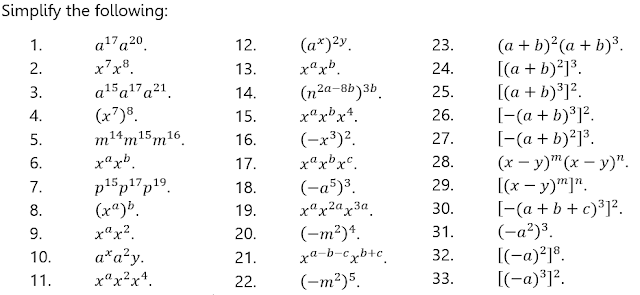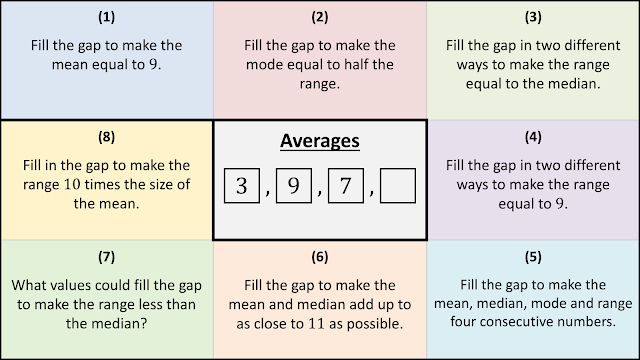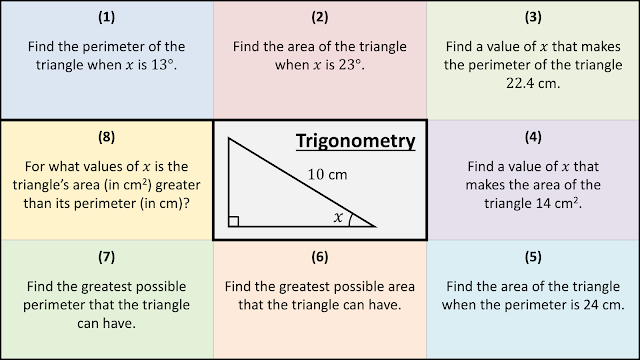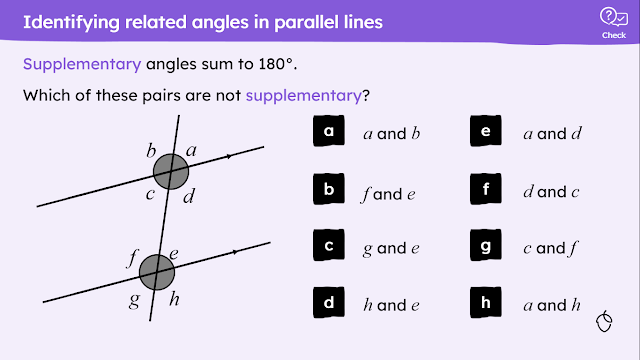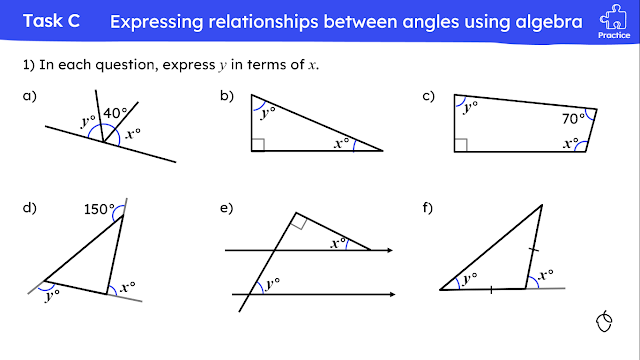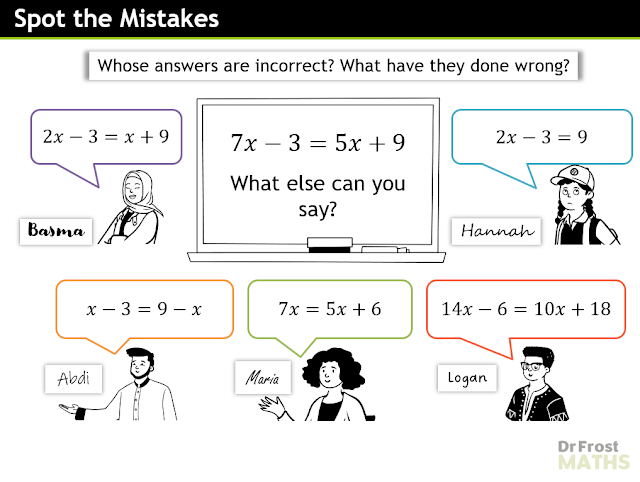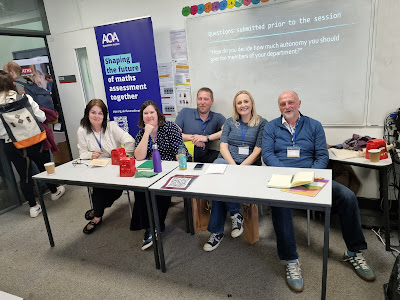GCSE Exam Style Questions by Topic
Booklets
Curriculum booklets are all the rage at the moment. I don’t teach using a ‘booklet approach’ myself, but I often make use of MathsPad‘s brilliant curriculum booklets, either when setting cover or when looking for good quality tasks to use in my teaching. MathsPad are well ahead of the game, having already published booklets for the entire Year 7 – 10 curriculum, with just Year 11 still to come. Each of their booklets comes in two levels: core and support. As always with MathsPad resources, their tasks are very well designed and their booklets include lots of lovely activities for challenge. Here’s an example I shared in Gems 175 – these algebra puzzles can be found in the booklet Year 10 Foundation Chapter 2: Algebraic Expressions. These puzzles have six levels of difficulty and would work well with any year group.
And following this there are some practice questions. For some reason I never explicitly teach this skill, so this page has inspired me to make a tweak to my teaching of this topic.
For more good examples of maths curriculum booklets, check out this one on diagonals in quadrilaterals from @AMercerMaths and this one on calculations with standard form from Nathan Day.
Artificial Intelligence
2024 was the first time that AI has really been on our radars in education. As a profession we’re rather sceptical about it. Teachers are increasingly encouraged to look to AI for workload-saving measures but I’m not convinced… Given that I don’t even like using other people’s PowerPoints in the classroom, I’m hardly going to start using AI to plan my lessons. And if I want to write a letter, it would be just as quick for me to write it myself rather then input a load of prompts into AI.
Maths teachers are even more sceptical than others because our initial attempts at using AI for task design using simple prompts like ‘give me ten wordy questions on sharing in a ratio’ have produced some rather dull tasks and a whole load of maths errors. However, there are two uses of AI worth keeping an eye on:
New Resources
We are fortunate in maths education to have a constant flow of new resources. I often feature these my gems posts and link to them in my resource libraries, which provide a quick way for teachers to find quality tasks for their lessons. Here I feature some of the most prolific publishers of new resources over the last year.
Nathan Day designs very clever tasks packed full of challenge and shares them through interwovenmaths.com. There’s a wide variety of resources to check out on his website, including these lovely ‘snake’ tasks.
Last year Dr Frost employed a team of writers to develop his original PowerPoints and expand his collection of resources. As a result there’s been a steady stream of new and improved content shared on drfrost.org, including significant updates to his A level maths and further maths PowerPoints. Follow @DrFrostResource to keep up-to-date with the new resources published.
Everything Else
There’s always something new being shared in the maths teaching community. Here are a few more things you may have missed over the past year:
- Craig Barton has continued to produce maths education podcasts. My most recent one was on ‘Ten ways to get amazing GCSE results‘ – I was pleasantly surprised by how much nice feedback this received!
- Rob Southern and Susan Whitehouse published the book Teaching A Level Maths.
- New website Maths Advance is full of very challenging extension questions, perfect for high attaining classes.
- LUMEN launched their Key Stage 3 curriculum: learn about it here.
- @StudyMaths continues to add new features to mathsbot.com. My favourite recent additions include Find the Primes and Prime Factory.
- @cclay8 shared a set of calculator guides for the new Casio model. I have found these really useful in ensuring that I’m familiar with all the functions and menus on the new calculators.
- PolyPad continues to develop its fantastic range of virtual manipulatives.
- @MattTheApp made hundreds of developments to Maths White Board over the last year – it’s packed full of games and activities for students.
- My favourite maths education tweets of the year have been from @catrionateaches who often shares really creative ideas to help improve the way we explain things.
- My favourite blog posts have been from @MrDraperMaths. His thoughts on task design are always worth reading.
Apologies if I have missed something big here. Keep an eye on my monthly gems posts – I try to cover everything in those!
Social Media
This summer, tweets by Elon Musk angered teachers so much that it sparked a mass exodus to other social media platforms (mainly Threads and BlueSky – though amongst maths teachers, it seems that BlueSky is the preference). Teachers are setting up new communities there where we can enjoy chatting about maths education without our feeds being full of racism and hatred. I already had accounts on both BlueSky and Threads so you can find me there if you wish (mathsjem), though I am still very hopeful that Twitter will come out the other side of all this. Hopefully the Musk nightmare is temporary.
Events and Conferences
If you’re looking to attend events with other maths teachers, there are always a lot to choose from.
I’m planning to have a year off hosting events myself, but there are plenty of conferences and events in the upcoming school year that are worth checking out. I have listed some of these here to give you a taste of what’s normally available, though most dates have not yet been published. If you’ve not attended before, why not give it a go?
- Complete Maths usually run three in-person conferences throughout the academic year. These take place on Saturdays in October, March and June at various locations in England. The next event is #mathsconf36 which is on 12th October in Sheffield.
- Big Maths Jam is a wonderful ‘recreational maths’ event taking place on 2nd – 3rd November 2024. It’s not about teaching – it’s about maths. There are also smaller monthly MathsJam events for maths enthusiasts to get together in a pub and share puzzles, games and problems. They normally meet on the second-to-last Tuesday of every month in locations around the world.
- Maths Hubs run loads of professional development opportunities throughout the year – get in touch with your local hub to find what’s on offer.
- The maths subject associations (including the MA and ATM) offer a range of CPD opportunities. This usually includes a big residential conference in the Easter holidays.
- The MEI Conference typically happens at the start of July.
Enjoy the rest of your summer break.
View the original article and our Inspiration here

